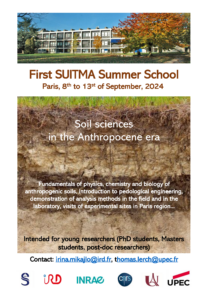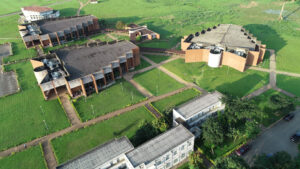Thesis defense of Alice Ardichvili
“Ecological and evolutionary dynamics of plant control of nitrification: implications for ecosystem functioning and structure at different scales”
Some plants can accelerate or slow down in soil the transformation of ammonium into nitrate (nitrification) via root exudates. This is the case of savanna grasses (inhibitors) or invasive grasses in North America (stimulators). As ammonium and nitrate are two assimilable forms of inorganic nitrogen, this control of nitrification modifies plant growth conditions. In the first part, I explored the ecological consequences (in terms of dynamics, productivity and community composition) of nitrification modulation, by varying plant preference for ammonium vs. nitrate. Inhibition of nitrification and strong preference for ammonium generates a positive feedback loop responsible for potential tipping points between a productive and a desert state. In a second part, I explored the evolutionary dynamics of the control of nitrification in a spatialized model. Inhibition of nitrification can evolve when plants have a sufficiently long life-span, and when ammonium losses are smaller than nitrate losses. I identified some environmental conditions and plant life-history traits which favor the evolution of control of nitrification. In a final section, I manipulated a simple theoretical two-patch model to study the impact of an organism building its niche in its patch, on the neighboring patch. The aim of this final part is to better identify the conditions under which a plant controlling the transformation rate of its two resources would have a facilitating effect on its neighbors. This work suggests that the control of nitrification could have frequently evolved among plants and, due to its major impacts on ecosystem functioning, that further empirical measures should aim at determining this trait.
Key-word: Nitrogen cycle, niche construction, adaptive dynamics, soil nitrification
Jury :
- Dr. Vincent CALCAGNO, Directeur de recherche INRAE (Sophia Antipolis), Rapporteur
- Dr. Sonia Kéfi, Directrice de recherche CNRS (Montpellier), Rapporteure
- Dr. Thomas KOFFEL, Maître de Conférence UdL (Lyon), Examinateur
- Dr. Sébastien BAROT, Directeur de recherche IRD, Directeur de thèse
- Pr. Jean-Christophe LATA, Professeur SU, Co-directeur de thèse
- Pr. Nicolas LOEUILLE, Professeur SU, Co-directeur de thèse
- Mail de l'orateur: alice.ardichvili@sorbonne-universite.fr




